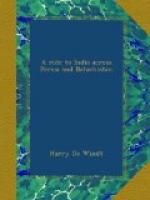An exclamation from Gerome suddenly drew my attention to the postmaster, who stood at the open doorway, my pelisse in hand. I was then unused to the ways and customs of the Persian peasantry, or should have known that it was but labour lost to make one spring at the old idiot, and, twining my fingers in his throat, shake him till he yelled for mercy. Nothing but a thick stick has the slightest effect upon the Shah’s subjects; and I was, for a moment, sorely tempted to use mine. The reader must own that I should have been justified. It was surely enough to try the patience of a saint, for the old imbecile had deliberately walked down to the river, made a hole in the ice, and soaked the garment in water to the waist, reducing it to its former condition of liquid slime. This was his method of getting the mud off. I may add that this intelligent official had assisted me in the drying process up till midnight.
There was no help for it; nothing to be done but cut off the damaged portion from the waist to the heels—no easy matter, for it was frozen as stiff as a board. “It will make a better riding-jacket now,” said Gerome, consolingly; “but this son of a pig shall not gain by it,” he added, stamping the ruined remains into the now expiring fire.
The village of Patchinar, at the foot of the dreaded Kharzan Pass, was to be our halting-place for the night. The post-road, after leaving Rustemabad, leads through the valley of the Sefid Roud river, in which, by the way, there is excellent salmon-fishing. About six miles from Rustemabad is a spot called by the natives the “Castle of the Winds,” on account of the high winds that, even in the calmest weather, prevail there. Although, out on the plain, there was a scarcely perceptible breeze, we had to literally fight our way against the terrific gusts that swept through this narrow gorge. Fortunately, it was a fine day, but the fine powdery snow whirled up and cut into our eyes and faces, and made travelling very unpleasant.
These violent wind-storms have never been satisfactorily accounted for. They continue for a certain number of hours every day, summer and winter, increasing in force till sunset, when they abate, to rise again the following dawn. On some occasions horses, and even camels, have been blown over, and caravans are sometimes compelled to halt until the fury of the storm has diminished.
Crossing a ridge of low hills, we descended into the valley of Roudbar, a quiet and peaceful contrast to the one we had just left. The wind now ceased as if by magic. Much of the snow had here disappeared under the warm sunshine, while before us, nestling in a grove of olive trees, lay the pretty village, with its white picturesque houses and narrow streets shaded by gaily striped awnings. It was like a transformation-scene, this sudden change from winter, with its grey sky and cold icy blast, to the sunny stillness and repose of an English summer’s day. We rode through the bazaar, a busy and crowded one for so small a place. A large trade is done here in olives. Most of it is in the hands of two enterprising Frenchmen, who started business some years ago, and are doing well.




